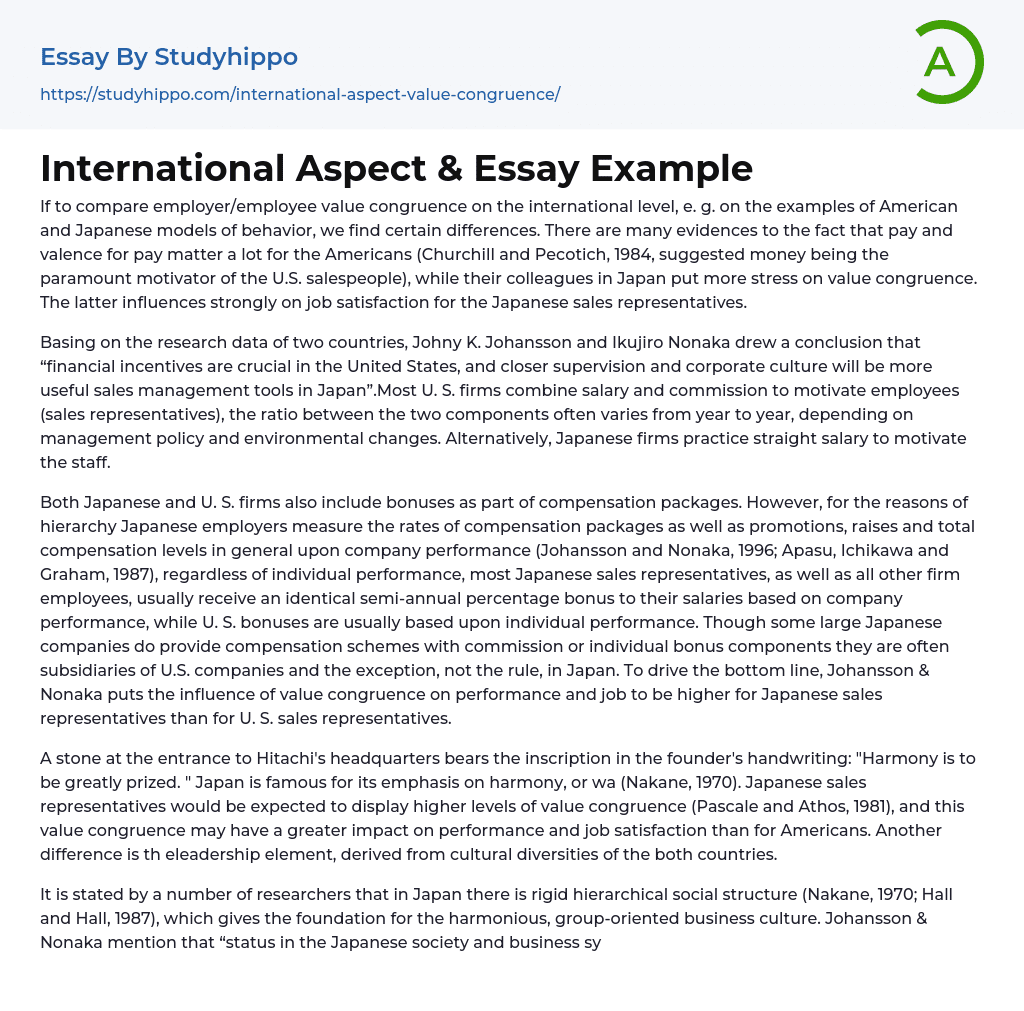Notable differences can be observed when examining the compatibility of employer and employee values on a global level, specifically between the American and Japanese behavior models. Evidence suggests that compensation holds significant importance for Americans; Churchill and Pecotich (1984) argued that money is the primary motivator for salespeople in the United States. Conversely, value congruence is more highly valued in Japan, influencing job satisfaction among Japanese sales representatives.
According to Johnny K. Johansson and Ikujiro Nonaka's research in two countries, financial incentives are important in the United States, whereas closer supervision and a strong corporate culture are more effective sales management tools in Japan. In the U.S., companies typically motivate their employees (sales representatives) through a combination of salary and commission, with the ratio between the two components varying year to year based on
...management policy and environmental changes. Conversely, Japanese firms use straight salary to motivate their staff.
In both Japanese and U.S. firms, bonuses are included in the compensation packages. However, while individual performance is the basis for U.S. bonuses, Japanese employers determine compensation rates, promotions, raises, and overall compensation levels by company performance (Johansson and Nonaka, 1996; Apasu, Ichikawa and Graham, 1987). This approach applies to most Japanese sales representatives as well as all other firm employees who receive a semi-annual percentage bonus to their salaries based on company performance. Though some large Japanese companies provide commission-based or individual bonus plans in their compensation schemes, such arrangements remain rare in Japan. Johansson ; Nonaka discovered that value congruence has a more significant impact on the job satisfaction and performance of Japanese sales representatives compared to those in the
U.S., underscoring the importance of aligning values with business objectives.
The founder of Hitachi wrote the words, "Harmony is to be greatly prized," which are engraved on a stone at the company's entrance. Japan is known for valuing harmony, also called wa (Nakane, 1970). In comparison to Americans, Japanese sales representatives are expected to display higher levels of value congruence (Pascale and Athos, 1981), and this congruence may have a greater impact on job satisfaction and performance. Additionally, cultural differences between Japan and America result in diverse leadership approaches.
According to several researchers such as Nakane (1970) and Hall and Hall (1987), Japan has a strict hierarchical societal structure that is the basis for its group-oriented, harmonious business culture. Johansson & Nonaka also note that status within Japanese society and the business world is determined by factors such as age, tenure, sex, education, and occupation.
The satisfaction of Japanese workers comes from feeling part of a strong group, whereas in the United States, a merit-based system of bonuses and raises creates a stronger link between pay and satisfaction. American executives managing sales forces in Japan agree that compensation systems used in the U.S. will not work in Japan. Japanese salespeople's variable pay is typically less than 5 percent, with winter and summer bonuses being the norm. Large commission portions of compensation would likely confuse and frustrate most Japanese sales reps, according to multiple managers. Additionally, U.S. recognition practices like "salesperson of the month" tend to embarrass instead of motivate group-oriented Japanese employees. These findings align with research by Hall and Hall (1987).
According to Hofstede (1991), Agarwal (1993), Hall (1987), and
other experts, there are notable differences between cultural groups. These differences suggest that in societies where individualism and economic success are prioritized, such as in the USA, individual qualities such as education, income motivation, and performance are highly significant. Conversely, in cultures where collective effort, personal relationships, and social rank hold greater importance, such as in Japan, organization-specific aspects like seniority and shared values take precedence.
- American Dream essays
- Barriers To Entry essays
- Capitalism essays
- Central Bank essays
- Compensation essays
- Consumerism essays
- Economic Development essays
- Economic Growth essays
- Economic Inequality essays
- Economic System essays
- Economy essays
- Employment essays
- Export essays
- Finance essays
- Free Trade essays
- Gross Domestic Product essays
- Human Development essays
- Income Inequality essays
- Industry essays
- Inflation essays
- International Business essays
- International Trade essays
- Macroeconomics essays
- Materialism essays
- Max Weber essays
- Microeconomics essays
- Minimum Wage essays
- Monetary Policy essays
- Monopoly essays
- Pricing essays
- Profit essays
- Recession essays
- resources essays
- Taxation essays
- Trade essays
- Unemployment essays
- Warehouse essays
- World economy essays
- Incentive essays
- Collective Bargaining essays
- Corporate Culture essays
- Hard Work essays
- Job Satisfaction essays
- Organizational Culture essays
- Organizational Structure essays
- Sweatshops essays
- Workforce essays
- Working capital essays
- Working Class essays
- Working Time essays




